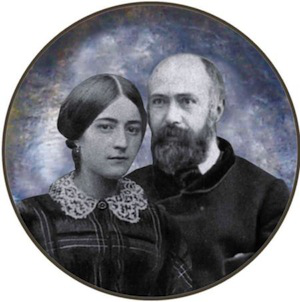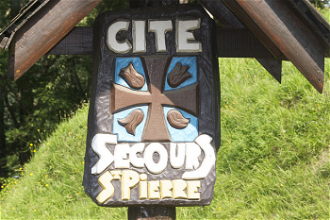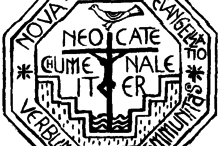Plymouth: Celebration of marriage in presence of relics of Blessed Louis & Zelie Martin

The relics of the parents of St Therese of Lisieux, Blessed Louis and Blessed Zelie Martin have been touring the Diocese of Plymouth.
Mass for Married couples and families was celebrated in the Cathedral in Plymouth on 16th May and in Holy Trinity Church, Dorchester on 19th May.
In his homily on both occasions, the Rt Rev Mark O'Toole, Bishop of Plymouth, drew attention to the "quiet heroism" of the couple who lived a life of holiness in the circumstances of ordinary family life.
He noted: "We should not assume that this couple lived in some kind of romantic Christian bubble. .....They put before us some important truths.
We see the great beauty of married life, when lived with open-ness and a deep sense of God's purpose. We see that difficulties and suffering are very much part of human life. When they touch the heart of the family they can still be lived with a quiet heroism, with a very deep trust in the presence of Jesus who unites Himself to our suffering.
We see that the task of the Family is indeed to be 'the domestic Church', as Blessed Pope Paul VI has described it, where children are encouraged to be selfless and to seek, in the everyday experiences of life, to become holy. And of course we see that serious illness, and the trials of getting older, can also be lived with generosity of spirit and against a transcendent horizon, which sees all of human life unfolding, 'for the greater glory of God'.
May the presence of this holy couple in our diocese rain down a shower of blessings on all of us, especially every married couple, and every family." During the mass married couples from across the Diocese, and beyond, were invited to renew their marriage vows.
Services for the sick, the bereaved, for young people and for schools were also held in the presence of the relics, and thousands have come to reverence the relics in both places.
The relics are in the Diocese of Plymouth from the 15th to 20th May and will then go to the Diocese of Portsmouth for three days, before returning to Lisieux.
Blessed Louis and Zelie are due to be Canonised Saints by Pope Francis, in Rome in October, during the Synod on the Family.
Bishop Mark's homily text follows:
It is such a great joy and deeply humbling to be in the presence of this great couple. I hope you do not mind if I spend these few minutes recalling some aspects of their life. I do so that we may be more conscious of their living presence among us. In this way, we can be inspired by what they have to teach us.
Both Louis and Zelie were born in the middle of the 19th century and both felt they were called to another kind of vocation.
Louis Martin was known for his idealism, always reflecting deeply on things. In many ways, he is a modern man, and by that I mean he is a man full of contradictions. He loved silence, but also lively adventure. He wanted to withdraw from the world yet he also loved to travel. He was stimulated by mathematics but, at the same time, liked reading romantic literature.
At 22 he leaves his home in Northern France for the great monastery of St Bernard in the Swiss Alps. He applies to enter that community of monks who spend their life praising God and supplying help for travellers in danger.
Zélie Guérin, on the other hand, was known as an impulsive, hard-working young woman. At 19 she applies to enter the community of the Daughters of Charity of St Vincent de Paul, in order to consecrate herself to God through caring for the sick.
Both arrive at their respective religious communities, but both are refused admission. Louis because he could not master Latin, which was considered essential at the time for monastic life, and Zélie because of poor health. Louis becomes a watchmaker, and opens his own shop; he is very successful and opens a jewellery shop, too. Zélie becomes an expert at embroidery, at the art of making "Alençon lace," a product which at the time was very popular. She is so successful she is able to open her own lace business, employing several people. In fact, later on her business is so successful that Louis gives up his work to assist her with the lace business.
The two meet when Louis is 34 years old, and Zélie 26, both of them by now convinced that they will have to live out their days in quiet and personal consecration to God. From their first meeting, however, they have a profound sense of being destined for one another. Later on, Zélie will tell her daughters that when crossing paths with the man who was to become their father, she heard deep in her heart a voice telling her, "He is the one I have prepared for you."
She told the story convinced that she had heard the voice of Our Lady. Again and again throughout her life there are examples of Zelie encouraging her family and friends to have full confidence in Mary, "trust her, she never lets you down," is a refrain regularly on her lips.
Truly Zelie, like the guests at the wedding feast of Cana, knew the presence of Mary at her side, encouraging Jesus to perform His miracles. Within three months of meeting, Louis and Zelie are married. There follow the busy years of raising children, working hard and being involved in their local parish.
Altogether they had nine children in thirteen years: two sons and seven daughters. Zélie and Louis lost two sons and one daughter, when the children were less than a year old. Another daughter, deeply loved in the family died when she was five. Five daughters survived; all were to become religious sisters, one of whom we all know as St Therese of the Child Jesus and of the Holy Face.
Day after day the parents experienced the truth that their children really belonged to God. They learned to accept the difficult pattern of birth and death, of sickness and healing, of things in family life getting worse and getting better, the cycle which was the lot of many children at that time is Europe.
Of course we know it is the same for so many children in our world today who die before their time, particularly in the developing world. To see a child die is a deeply tragic experience, and especially for parents. There can be no worse thing. There are many who know such incredible pain and loss. What makes the Martin couple such an extraordinary example was their very deep faith in the face of such terrible suffering.
Both Louis and Zelie believed all their children were a gift of God. They therefore re-entrusted their children into the loving hands of the God who had created them. They refused to give way to the notion that life was meaningless, some obscure chance happening. This did not mean forgetting or suffering less acutely. Rather, it meant continuing to believe in the life they had given to their children, maintaining a relationship with them, and continuing to pray and work for them no matter what.
In one of her letters, Zelie says of the deaths of her children, "When I closed the eyes of my dear children and prepared them for burial, I was indeed grief-stricken... but, thanks to God's grace, I have always been resigned to His will. I do not regret the pains and sacrifices I underwent for them." She then goes on to say that she "doesn't understand people who say 'You'd have been better not to have gone through all of that." She adds, "They're enjoying heaven now. Moreover, I have not lost them always. Life is short, and I shall find my little ones again in heaven."
Of the children who survive, both parents instil in them a deep sense of God's purpose. Again and again, Zelie will say to them, "My task in this life, as your mother, is to help you to become saints." Certainly we can say with confidence, St Therese became a saint because of them. So, we should not assume that this couple lived in some kind of romantic Christian bubble. Not only was there the deaths of four of their children.
At the age of 45, Zelie is diagnosed with breast cancer; it is too advanced and there is no treatment and within months she joins her four dead children. Therese, the youngest child, is four and half years old.
We know about the life she lived at Les Buissonets with her sisters and father from her lovely autobiography, Story of a Soul.
We know her exceptional trust and confidence in God and her "little way" which consists in doing simple things with great love.
These things, I believe, Therese first learnt at home, in the bosom of her family, and especially form her parents. We know, too, the difficulties of Louis' health, following the death of his wife and the departure of his daughters into religious life. Whilst Therese is in the convent, he is hit by two strokes, one after the other. There is temporary but ever more frequent psychological degeneration: loss of memory, difficulty in speaking, hallucinations, periods of depression, desires to go far away and hide from everyone. All of this was probably due to a form of neurological dementia, and meant that he had to spend three years in a psychiatric hospital. During lucid moments he feels humiliated, but is heard to say, "Lord, all for your greater glory." This is the couple we have before us today.
They put before us some important truths. We see the great beauty of married life, when lived with openness and a deep sense of God's purpose. We see that difficulties and suffering are very much part of human life. When they touch the heart of the family they can still be lived with a quiet heroism, with a very deep trust in the presence of Jesus who unites Himself to our suffering. We see that the task of the Family is indeed to be 'the domestic Church', as Blessed Pope Paul VI has described it, where children are encouraged to be selfless and to seek, in the everyday experiences of life, to become holy.
And of course we see that serious illness, and the trials of getting older, can also be lived with generosity of spirit and against a transcendent horizon, which sees all of human life unfolding, "for the greater glory of God". May the presence of this holy couple in our diocese rain down a shower of blessings on all of us, especially every married couple, and every family.
+ Mark O'Toole Bishop of Plymouth


















